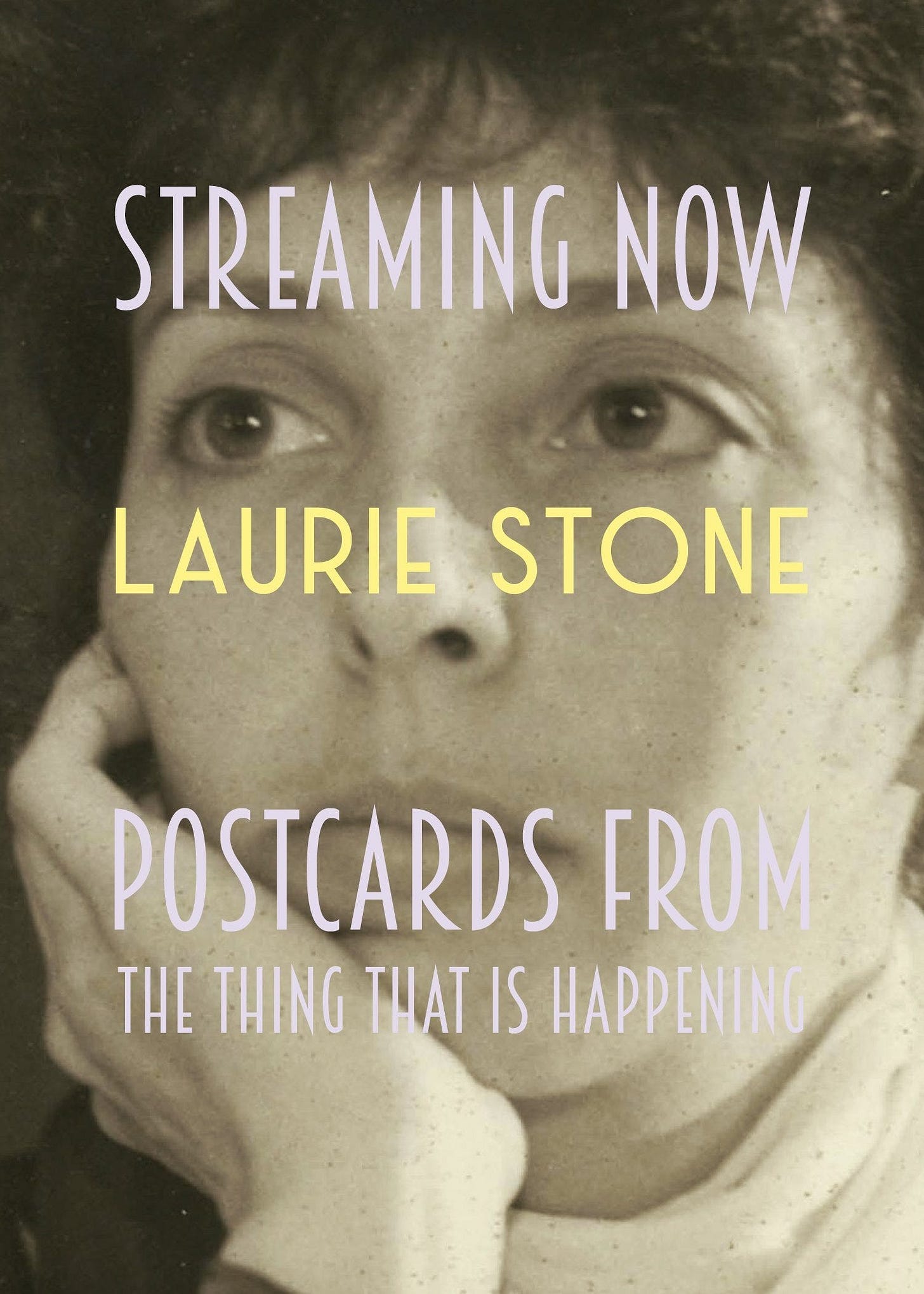The other day, I found a short story I’d written decades ago about a man I knew briefly. The story contains details I’d forgotten about things we did in bed and the way we ended our relationship. I was kind of interested in these details from the point of view of, “Really, I did that? I thought that? That happened?” Maybe the things in the story had really happened, and maybe I had made up some stuff at the time I wrote it.
As I read about these things, details kind of came back to me, and I thought, “Wow, damn,” and the reason I thought, “Wow, damn” was that I had moved away from the person acting in the story. This part doesn’t matter. I’m only telling it to you, because we’re talking.
What matters is how I looked at the old text to see if anything was still alive in it, and by “alive” I mean if anything could be salvaged by the lights of how I work now. Mostly, the original story was off in tone. The narrator’s emotional state is still fluttering, mothlike, on the railing of a recent experience. She’s sad and confused. She’s trying not to write a victim story, but she doesn’t manage it. It’s still, more or less, a version of, “He done her wrong.”
When I wrote it, I may have tricked myself into thinking I was saying something like, “Look what people are capable of when they enter a sexual trance state.” Right there, you can see this is a mistaken proposition. A story that thinks it has a project to “show” readers something is doomed to rob them of feeling things. People don’t come to literature to learn. They come to be tricked into thinking the story is about them, and they owe no obligation to the narrator or to the author to harvest a nugget of caution, or advice, or even information. If they do harvest something like that, it’s a side bar. If teaching is at the front and center of a piece, it’s not in the category of art, which aims to stir and confuse readers, not resolve things or calm them down.
There was no lightness or joy in the writing of the original story. It’s sticky and a bit panting. These days, I have a check list of five elements I think a piece needs to be on its way to the reader:
Start in the middle.
Fail to arrive.
Remember to love something.
Make the reader hot.
Make the reader laugh.
We’ve already covered “start in the middle” and “fail to arrive”—I mean at resolution or at a moral the reader is intended to extract. When I say, “make the reader hot,” I mean arouse the reader’s thoughts and feelings. Stirring thought is a form of arousal. When I say, “make the reader laugh,” I’m saying, make sure there is enough detachment in the narrator’s tone, so readers can see irony and maybe the flip side of anything proposed. “Remember to love something” is the most important item on the list and is the key, I think, to producing a piece readers can enter. It’s the narrator’s love for the thing the narrator wants to talk to you about that captures readers, even if the narrator isn’t evoking an experience of love, itself.
As I read the old story now, I could see that the narator couldn’t tell what other people thought of her. She didn’t imagine herself in other people’s minds, just as I did not, at the time I wrote it. I could see this clearly now, and I wondered how this insight might change my approach to the story.
I deleted most of the sentences I’d originally written and left in ones with concrete descriptions I could riff on now. In the revised version, the narrator discovers she made a mistake early on, and the mistake is who she is. In this version, the reader doesn’t have to worry that they know more about the character than the character knows about herself or that even the author knows about the narrator. This is partly what gives the reader space to enter the story.
Does any of the story that’s left reflect what “really happened”? Possibly, but it doesn’t explain all kinds of things that went on between the actual man and me. I didn’t care about those things in this go-round. They didn’t stimulate further associations. It’s now a story, quite independent of memory. I would say that everything I write is fiction, even when the events are drawn from my life, because once I write the first sentence, I’m thinking about what langauge can produce for the next sentence, not about following events in the memory.
This way of looking back, with detachment gained from time—for the purpose of making art and not recording a life—is a great pleasure and a great liberation. Weirdly, perhaps, I’ve learned more about myself by trying to improve a story than I ever did from looking at my behavior straight on.
Here is the original story, whittled down to a flash fiction. See if it passes the check list. It may not, by your lights, and that, too, is okay.
Erik
The way Erik twirled his hair became sexy. His awkwardness became sexy. There was a scar under his chin. Doesn’t everyone have a scar under their chin?
He rolled his own cigarettes. In the morning, there would be too many things to juggle: the pouch of tobacco, the papers, the lighters he would search for in his pockets. He would form a chubby caterpillar of tobacco, lick the paper, and roll it tight. Nervous threads would jut from the ends and, once lit, fly into the air or onto his shirt. As soon as he was awake, he’d light up, sitting cross-legged on his bed, an ashtray balanced on one knee, chanting prayers for his mother, who had recently died.
He said, "Smoking is my last addiction." He was planning to quit, and he was planning to stay with me. We both knew he wouldn’t do either. He said he would ask nothing of me I didn’t want. I said I didn’t know what I wanted. Once, I dumped an ashtray of his butts into the trash bin in my kitchen. One butt was still burning, and it left a mark on the bottom of the bin. Every time I change the bag, the burn winks up at me.
Before we had sex, we went to a movie and afterward walked up Columbus Avenue, stopping every so often so he could roll a cigarette. He lifted a thread of tobacco off his tongue in front of a clothing store and said, “You could wear that,” pointing to a black dress that looked like a slip. Near the dress was a strand of metal beads that looked like little beebees. “With that.” At the subway, he kissed my cheek, putting his hand at the back of my head and pulling me ever so slightly toward him.
The next time we met on Christopher Street, at his mother's place. There were cartons everywhere and piles of things he wanted to take and piles of things he intended to throw away. He roamed the rooms, drumming on the cartons instead of filling them, stirring up the dust of his past. I'd offered to help him, because he’d said he couldn’t ask for help. I removed clothes from closets and placed them in the cartons, while he made coffee and smoked. He said, "You didn’t have to come here."
I didn’t know anything about him, and there I was, in the middle of his mess, and it occurred to me I didn’t belong there. It was too much too soon, and I could see, too, I liked being where I didn’t belong. As I look back, I see this is the thing that would undo me with Erik and elsewhere in my life. When Erik said, “You didn’t have to come here,” he was saying, “You shouldn’t have come here.”
I might have understood that, even if I couldn’t adjust myself to what he was saying, although I don’t think I understood what he was saying. That is the nature of losing yourself. I could tell you all the other things I did wrong that stemmed from this first mistake, but why bother?








Thanks so much for hosting me, Sari, in a new section of your stack world, where I am hoping to meet new readers and writers. xxL
Hi to all on Memoir Land. I want to invite you to the next Zoom Conversation I am hosting on writing craft. It's on Saturday, February 24 from 3 to 4 pm EST. Everyone who signs up is invited to send ahead a specific question about their writing projects. This is a benefit to paid subscribers to my Substack, "Everything is Personal," and there is no extra charge. The Zooms are for subscribers at a monthly or annual rate, and today there is a discount of 25% off the usual price. To RSVP to the Zoom, please write to me here: lauriestone@substack.com. To subscribe to my Substack, please click here: lauriestone.substack.com/subscribe